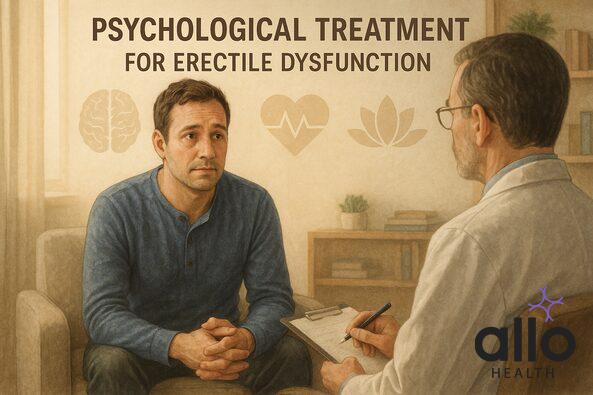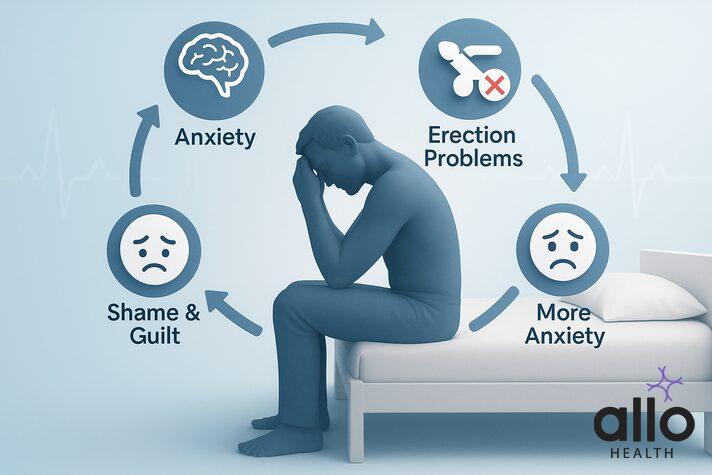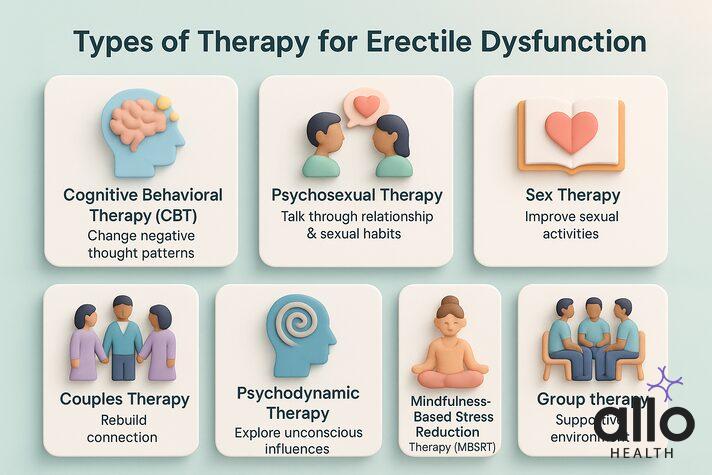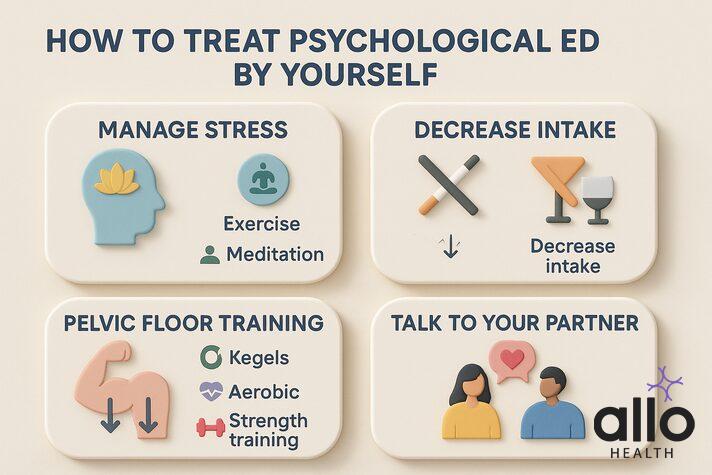Psychological Therapy for ED: Healing the Mind to Heal the Body

Psychological erectile dysfunction is often rooted in stress, anxiety, or relationship struggles and therapy can help break this cycle. Approaches like Cognitive Behavioral Therapy (CBT), sex therapy, psychosexual therapy, couples counseling, and mindfulness-based stress reduction (MBSRT) have been shown to reduce anxiety, rebuild confidence, and strengthen intimacy. For deeper issues, options like psychodynamic therapy or hypnotherapy may uncover hidden triggers, while group therapy offers support from others facing the same challenges. With the right therapeutic approach, men can heal both mind and body, restoring healthy sexual function and emotional well-being.
Erectile dysfunction can occur due to psychological reasons. It is not just a purely physical problem. Stress, anxiety, depression, or relationship struggles can affect mental health, and that can affect the body.
Psychological therapy can help with this. These treatments teach you to deal with the mental factors behind erectile dysfunction. Through psychological approaches, men can rebuild confidence, intimacy, and sexual function.
Let’s explore how psychotherapy works, the benefits it brings, and the ways it can help heal both the mind and the body.
The Psychological Cycle of Erectile Dysfunction
Erectile dysfunction often begins with anxiety about sexual performance. Worries related to relationship stress or body image can make it difficult to achieve or maintain an erection. When that happens, feelings of shame, frustration, or guilt often follow. These negative emotions fuel even more anxiety, which in turn makes erections harder to achieve. This repeating loop of worry → dysfunction → distress → more worry creates a self-perpetuating cycle known as psychogenic ED. Over time, this cycle can:
- Damage self-confidence
- Reduce interest in sex
- Strain relationships
- Contribute to mental health concerns like depression & anxiety
Breaking this cycle requires addressing not just the physical aspects of ED but also the psychological triggers that keep it going.

Psychological Treatment for Erectile Dysfunction
Sometimes, therapeutic techniques are needed for the treatment of psychological erectile dysfunction. Talking about your mental and sexual history (psychosexual history) with a therapist can help in proper treatment. Different men respond to different therapies.
Here are the most effective options:
- Cognitive behavioural therapy.
- Psychosexual Therapy.
- Sex Therapy.
- Couples Therapy.
- Psychodynamic Therapy/ Hypnotherapy.
- Mindfulness-Based Stress Reduction Therapy (MBSRT)
- Group Therapy.
1. Cognitive Behavioral Therapy (CBT):
Focus: Cognitive behavioural therapy helps people change negative thought patterns.
Benefits: This form of therapy can help reduce feelings of failure, hopelessness, depression, and anxiety.
Effectiveness: A 10-session CBT program found that ED decreased by 50% by the end of the program. [1]
2. Psychosexual Therapy:
Focus: Psychosexual Therapy involves talking about your relationship. It helps to identify trouble areas and analyse your sexual patterns. It can be individual or with a partner.
Benefits: This form of therapy can help make you aware of your sexual habits and reduce sexual anxiety. It can be great for building a more communicative relationship. Sexual communication can strengthen feelings of connection with your partner. You may even gain new ideas on how to approach future sexual issues related to psychological reasons.
Effectiveness: Psychosexual counselling [2] can improve the quality of the sexual relationship.
3. Sex Therapy:
Focus: Sex Therapy involves talking about sexual experiences. It can help gain information on how to improve sexual activities.
Benefits: Sex therapy can help improve your knowledge about sex and sexual health.. A sex therapist can recommend specific exercises to improve your sex life. It doesn’t usually involve analysing deeper psychological issues.
Effectiveness: A study [3] found that an average of 5 sessions of sex therapy were enough to get the symptoms under control. A year after completing the treatment, 87% of patients no longer suffered from ED.
4. Couples Therapy:
Focus: Couples therapy creates a space for partners to talk about their emotions and relationship concerns.
Benefits: This form of therapy can help couples resolve issues in the relationship that may be causing stress and distance. It teaches healthier ways to express needs and concerns. It focuses on improving connection and intimacy.
Effectiveness: Studies [4] show that couples counseling helps improve communication and strengthen intimacy.
5. Psychodynamic Therapy/ Hypnotherapy:
Focus: Hypnotherapy explores unconscious thought processes and how past experiences shape present behaviour.
Benefits: It helps deal with unresolved childhood trauma or past relationship conflicts. This brings hidden feelings into awareness. This type of therapy helps have a healthier relationship with sexuality.
Effectiveness: A study [5] showed that all the patients who completed their course of hypnotherapy were able to perform.
Some men have shared real-life experiences of using CBT and hypnotherapy for ED, [6] describing how these approaches helped them manage anxiety and improve sexual confidence.
6. Mindfulness-Based Stress Reduction Therapy (MBSRT):
Focus: A structured program that combines meditation, breathing techniques, and body awareness practices. This type of therapy helps people manage stress.
Benefits: It helps lower stress and performance anxiety. It can help to stay focused rather than worrying about failure. It helps calm the nervous system, reduce negative thought patterns, and promotes emotional balance. This can make it easier for natural arousal to occur.
Effectiveness: A study [7] found that men reported improvement in sexual function after a four-week program. The program included education, counseling, and mindfulness meditation.
7. Group Therapy:
Focus: involves a group of patients with ED coming together under the guidance of a professional therapist.
Benefits: Creates a supportive environment to share experiences and discuss common issues. Patients can learn coping techniques and not feel alone with their problem.
Effectiveness: Studies suggest that group therapy is a promising technique for men with ED.
I know ED can feel frustrating, but it doesn’t make you any less of a man. Most of the time, it’s your mind reacting to a problem that’s stressing you out, and that’s something we can work on together.
Self-Treatment for Erectile Dysfunction:
Self-treatment for psychological erectile dysfunction is possible. The first step is identifying the triggers. Reflect on areas of your life that may be affecting your sexual function.
Are you feeling stressed at work? Are there any unresolved problems with your sexual partners? Are you worried that you aren’t able to provide sexual satisfaction to your partner? Have you recently experienced any life changes that might be affecting your mental health? Are you on any medication that may cause sexual side effects?
Anxiety, particularly sexual performance anxiety, is one of the most common causes of psychological ED. The pressure to perform perfectly every time can make it harder to relax and enjoy the moment. Other potential triggers include:
- depression
- low self-esteem
- body image issues, like concerns about penis size.
- past trauma or negative sexual experiences.
How to treat psychological ED by yourself:
Manage Stress
Managing high levels of stress through lifestyle changes can have a significant impact on your sexual health. Some stress-reducing practices include:
- Movement: Exercise has been shown to reduce stress and improve mood. It also increases blood circulation and testosterone levels. This boosts sexual performance. Consider adding low-impact exercises like yoga or walking into your daily routine.
- Mediation: By calming the nervous system and lowering stress hormones, meditation helps you to stay present. Mindfulness training reduces negative thoughts and promotes relaxation. Over time, regular meditation also supports emotional balance and self-confidence.
- Lifestyle habits: Habits like smoking and excessive alcohol intake impact erections. Nicotine in cigarettes narrows blood vessels, reducing circulation to the penis. Alcohol in large amounts acts as a depressant and can dull sexual function. Quitting improves physical health and reduces anxiety levels. It gives the body a better chance to respond during intimacy.
Pelvic floor muscle training
These exercises improve blood flow and strengthen pelvic floor muscles.
- Kegel exercises
- Aerobic exercises
- Strength training exercises
Talk to your partner
Many men feel ashamed to discuss their ED with their sexual partners. This can create stress and distance, which can cause relationship concerns. Open and honest communication is important when dealing with psychological erectile dysfunction. It’s important to understand that ED affects both you and your partner. Being vulnerable with your partner can help them provide you with emotional support. Working together to improve sexual communication can relieve some of the pressure you’re putting on yourself.
Rule Out Physical Causes
Health issues like high blood pressure, heart disease, hormonal imbalances, and side effects of medicine can cause ED. Consulting a doctor can help rule out any of these causes.
Doctors usually recommend a basic medical check-up that can include:
- Physical exam
- Blood tests to test hormonal balance
- Blood pressure measurement
- Cardiac testing
- Review of medications
Bottom Line
Sometimes, the biggest causes of erectile dysfunction come from the mind. Stress, anxiety, depression, and relationship struggles can create a cycle that feels impossible to escape. The good news is that psychological therapy offers men a way to break that cycle.
There are various approaches to help men overcome this. These include behavioral therapy and mindfulness practice. These therapies can help rebuild confidence, reduce anxiety, and reconnect with their partners. Self-care practices also play an important role. These include stress management, exercise, meditation, and open communication.
The most important message is this: you are not alone. Psychological ED is treatable. Through lifestyle changes, the right support, and professional help, recovery is possible. Taking the first step can open the door to a healthier sex life and greater emotional well-being.
"The following blog article provides general information and insights on various topics. However, it is important to note that the information presented is not intended as professional advice in any specific field or area. The content of this blog is for general educational and informational purposes only.
Book consultation
The content should not be interpreted as endorsement, recommendation, or guarantee of any product, service, or information mentioned. Readers are solely responsible for the decisions and actions they take based on the information provided in this blog. It is essential to exercise individual judgment, critical thinking, and personal responsibility when applying or implementing any information or suggestions discussed in the blog."








